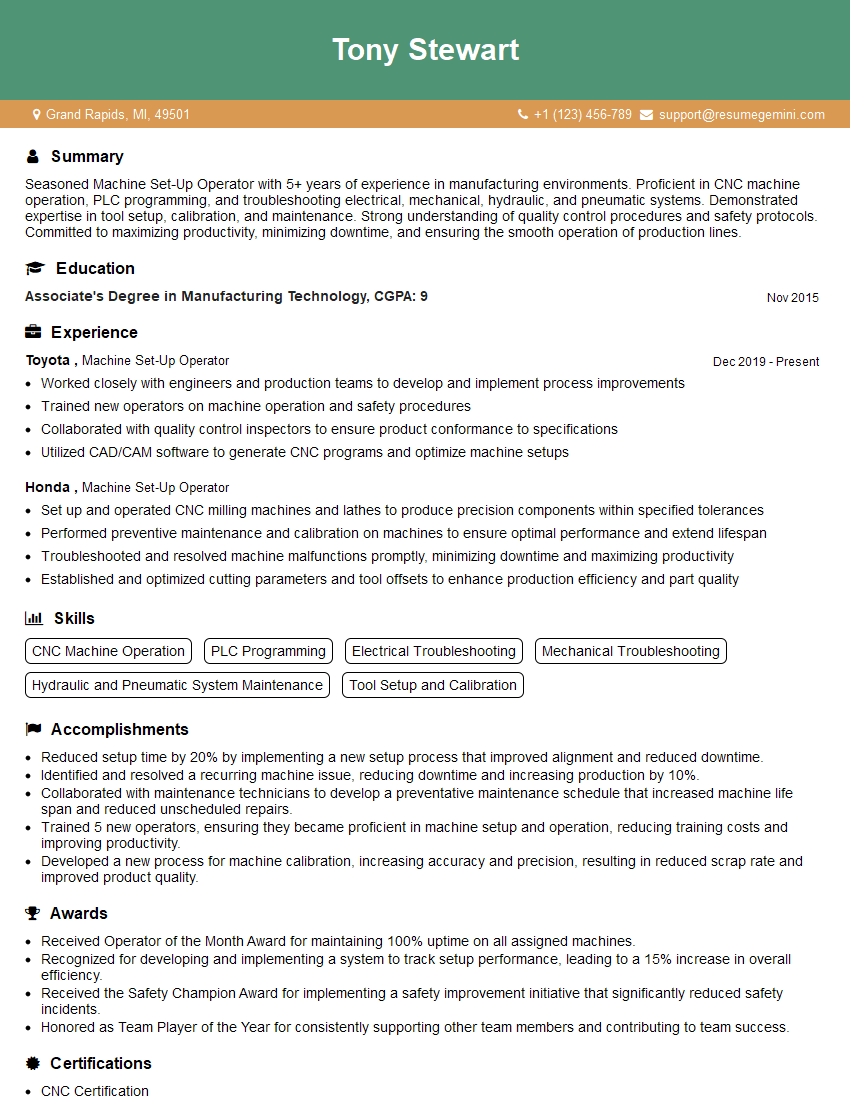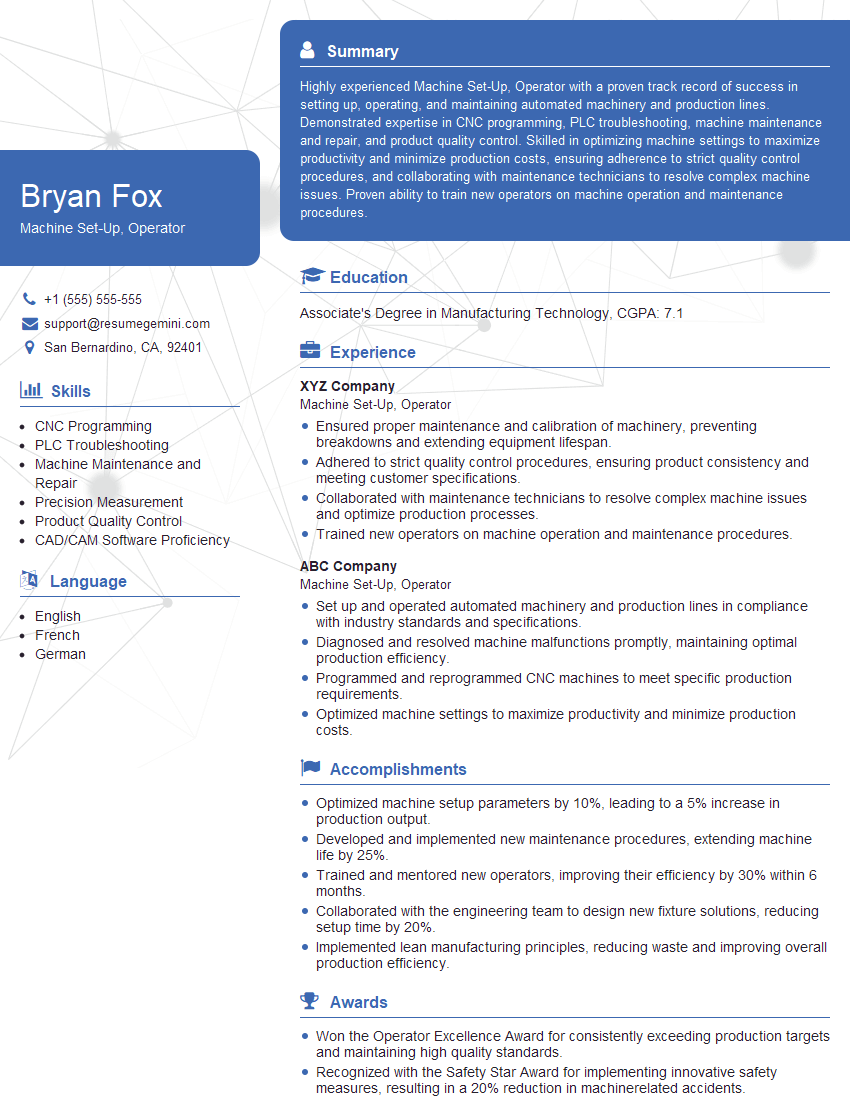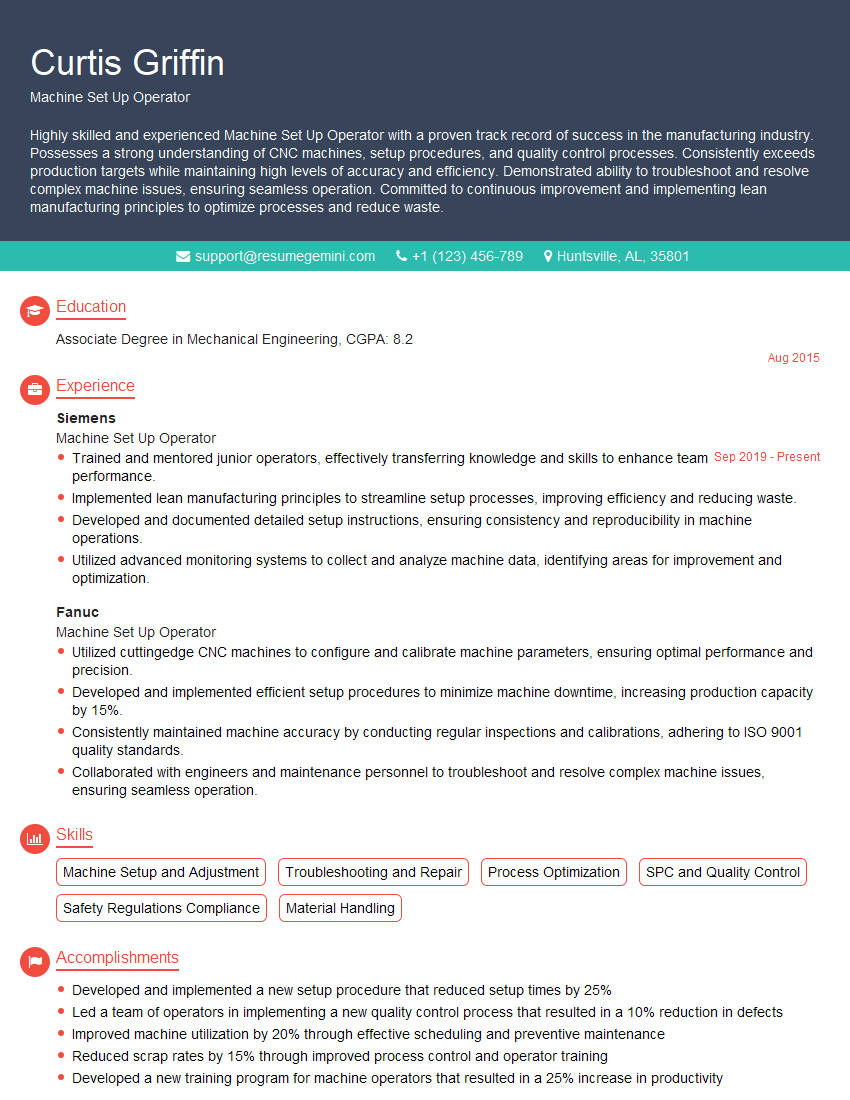Are you gearing up for an interview for a Machine Set-Up Operator position? Whether you’re a seasoned professional or just stepping into the role, understanding what’s expected can make all the difference. In this blog, we dive deep into the essential interview questions for Machine Set-Up Operator and break down the key responsibilities of the role. By exploring these insights, you’ll gain a clearer picture of what employers are looking for and how you can stand out. Read on to equip yourself with the knowledge and confidence needed to ace your next interview and land your dream job!
Acing the interview is crucial, but landing one requires a compelling resume that gets you noticed. Crafting a professional document that highlights your skills and experience is the first step toward interview success. ResumeGemini can help you build a standout resume that gets you called in for that dream job.
Essential Interview Questions For Machine Set-Up Operator
1. What are the key responsibilities of a Machine Set-Up Operator?
The key responsibilities of a Machine Set-Up Operator typically include:
- Setting up and preparing machines for production
- Installing and adjusting dies, fixtures, and other tooling
- Ensuring that machines are operating properly and efficiently
- Monitoring production processes and making adjustments as needed
- Troubleshooting and resolving machine problems
- Performing preventive maintenance and repairs on machines
- Following safety procedures and regulations
- Working with other team members to ensure smooth production
2. What are the different types of machines that you have experience setting up?
I have experience setting up a variety of machines, including:
- CNC machines
- Lathes
- Mills
- Drilling machines
- Grinders
- Presses
I am also familiar with the setup and operation of automated production lines.
3. What are the most important factors to consider when setting up a machine?
The most important factors to consider when setting up a machine include:
- The type of material being processed
- The desired output
- The accuracy and precision required
- The safety of the operator and others
- The efficiency of the process
4. How do you ensure that a machine is set up correctly?
I ensure that a machine is set up correctly by following a series of steps, including:
- Reading and understanding the machine’s manual
- Inspecting the machine for any damage or wear
- Installing and adjusting the appropriate tooling
- Testing the machine to ensure that it is operating properly
- Making any necessary adjustments
5. What are some of the common problems that you have encountered when setting up machines?
Some of the common problems that I have encountered when setting up machines include:
- Incorrect tooling
- Worn or damaged parts
- Electrical problems
- Software errors
- Operator error
6. How do you troubleshoot and resolve machine problems?
I troubleshoot and resolve machine problems by following a systematic approach, including:
- Identifying the problem
- Gathering information about the problem
- Developing and testing possible solutions
- Implementing the solution
- Verifying that the problem has been resolved
7. What are some of the safety procedures that you follow when working with machines?
The safety procedures that I follow when working with machines include:
- Wearing appropriate safety gear
- Following lockout/tagout procedures
- Being aware of the location of emergency stops
- Using machines only for their intended purpose
- Reporting any unsafe conditions or practices
8. How do you stay up-to-date on the latest machine technology?
I stay up-to-date on the latest machine technology by:
- Reading trade publications
- Attending industry events
- Taking training courses
- Networking with other machine operators and engineers
9. What are your strengths as a Machine Set-Up Operator?
My strengths as a Machine Set-Up Operator include:
- My attention to detail
- My ability to troubleshoot and resolve problems quickly
- My commitment to safety
- My strong work ethic
- My ability to work independently and as part of a team
10. What are your salary expectations?
My salary expectations are commensurate with my experience and qualifications.
I am confident that I can make a significant contribution to your company and I am eager to learn more about this opportunity.
Interviewers often ask about specific skills and experiences. With ResumeGemini‘s customizable templates, you can tailor your resume to showcase the skills most relevant to the position, making a powerful first impression. Also check out Resume Template specially tailored for Machine Set-Up Operator.
Career Expert Tips:
- Ace those interviews! Prepare effectively by reviewing the Top 50 Most Common Interview Questions on ResumeGemini.
- Navigate your job search with confidence! Explore a wide range of Career Tips on ResumeGemini. Learn about common challenges and recommendations to overcome them.
- Craft the perfect resume! Master the Art of Resume Writing with ResumeGemini’s guide. Showcase your unique qualifications and achievements effectively.
- Great Savings With New Year Deals and Discounts! In 2025, boost your job search and build your dream resume with ResumeGemini’s ATS optimized templates.
Researching the company and tailoring your answers is essential. Once you have a clear understanding of the Machine Set-Up Operator‘s requirements, you can use ResumeGemini to adjust your resume to perfectly match the job description.
Key Job Responsibilities
Machine Set-Up Operators are responsible for preparing and operating machinery for production. They work to ensure that machines are set up and running efficiently, and inspect and test products to verify that they meet quality standards.
1. Setup and Operation
Machine Set-Up Operators are responsible for setting up machines for production. This includes making necessary adjustments to the machine, installing and securing materials, and testing the machine to ensure that it is running correctly. They also are responsible for operating the machine to produce parts or products.
- Install and secure materials
- Operate machines to produce parts or products
2. Monitoring and Inspection
Machine Set-Up Operators are responsible for monitoring machines during production to ensure that they are running smoothly and producing parts or products that meet quality standards. They may also conduct visual inspections of finished parts or products to ensure that they meet specifications.
- Monitor machines during production
- Conduct visual inspections of finished parts or products
3. Troubleshooting and Maintenance
Machine Set-Up Operators are responsible for troubleshooting and resolving minor issues with machines. They may also perform basic maintenance tasks, such as cleaning and lubrication, to keep machines running efficiently.
- Troubleshoot and resolve minor issues with machines
- Perform basic maintenance tasks
4. Safety and Compliance
Machine Set-Up Operators are responsible for ensuring that they follow all safety regulations and procedures while working. They must be familiar with the equipment they are operating and the materials they are handling, and they must wear the appropriate safety gear.
- Follow all safety regulations and procedures
- Wear the appropriate safety gear
Interview Tips
Preparing for an interview for a Machine Set-Up Operator position will help you make a great impression on the interviewer and increase your chances of getting the job. Here are some tips:
1. Research the Company and the Position
Before the interview, take some time to research the company and the position you are applying for. This will help you understand the company’s culture and values, and the specific requirements of the job. You can find information about the company on their website, social media pages, and Glassdoor. You can also learn more about the position by reading the job description and talking to people in your network who work in similar roles.
2. Practice Answering Common Interview Questions
There are a number of common interview questions that you are likely to be asked, such as “Tell me about yourself” and “Why are you interested in this position?” It is helpful to practice answering these questions in advance so that you can deliver your responses confidently and concisely.
- Tell me about yourself
- Why are you interested in this position?
3. Highlight Your Skills and Experience
In your interview, be sure to highlight your skills and experience that are relevant to the position you are applying for. For example, if you have experience setting up and operating machines, or if you have a strong understanding of safety regulations, be sure to mention this in your interview. You can also provide examples of how you have used your skills and experience to improve efficiency and productivity in your previous roles.
4. Be Enthusiastic and Professional
It is important to be enthusiastic and professional during your interview. This shows the interviewer that you are interested in the position and that you are confident in your abilities. Be sure to make eye contact, speak clearly, and dress appropriately. You should also be prepared to ask the interviewer questions about the position and the company.
5. Follow Up
After the interview, be sure to send a thank-you note to the interviewer. This is a simple way to show your appreciation for their time and consideration. You can also use the thank-you note to reiterate your interest in the position and to highlight any specific skills or experience that you feel would be valuable to the company.
Next Step:
Now that you’re armed with a solid understanding of what it takes to succeed as a Machine Set-Up Operator, it’s time to turn that knowledge into action. Take a moment to revisit your resume, ensuring it highlights your relevant skills and experiences. Tailor it to reflect the insights you’ve gained from this blog and make it shine with your unique qualifications. Don’t wait for opportunities to come to you—start applying for Machine Set-Up Operator positions today and take the first step towards your next career milestone. Your dream job is within reach, and with a polished resume and targeted applications, you’ll be well on your way to achieving your career goals! Build your resume now with ResumeGemini.


